
The Righteous Brothers are an American musical duo originally formed by Bill Medley and Bobby Hatfield but now comprising Medley and Bucky Heard. Medley formed the group with Hatfield in 1963. They had first performed together in 1962 in the Los Angeles area as part of a five-member group called the Paramours, and adopted the name The Righteous Brothers when they became a duo. Their most active recording period was in the 1960s and '70s, and, after several years inactive as a duo, Hatfield and Medley reunited in 1981 and continued to perform until Hatfield's death in 2003. The music they performed is sometimes dubbed "blue-eyed soul".
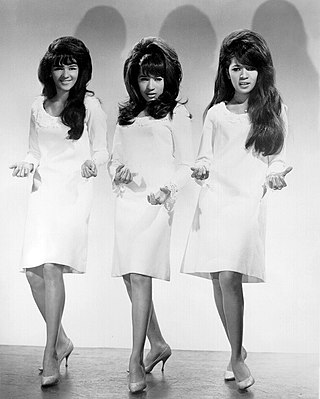
The Ronettes were an American girl group from Washington Heights, Manhattan, New York City. The group consisted of lead singer Veronica Bennett, her older sister Estelle Bennett, and their cousin Nedra Talley. They had sung together since they were teenagers, then known as "The Darling Sisters". Signed first by Colpix Records in 1961, they moved to Phil Spector's Philles Records in March 1963 and changed their name to "The Ronettes".

Ike & Tina Turner were an American musical duo consisting of husband and wife Ike Turner and Tina Turner. From 1960 to 1976, they performed live as the Ike & Tina Turner Revue, supported by Ike Turner's band the Kings of Rhythm and backing vocalists called the Ikettes. The Ike & Tina Turner Revue was regarded as "one of the most potent live acts on the R&B circuit."

Darlene Wright, known professionally as Darlene Love, is an American singer and actress. She was the lead singer of the girl group the Blossoms and she also recorded as a solo artist.

Robert Lee Hatfield was an American singer. He and Bill Medley were the Righteous Brothers. He sang the tenor part for the duo, and sang solo on the group's 1965 recording of "Unchained Melody".

Sparks is an American pop and rock duo formed by brothers Ron (keyboards) and Russell Mael (vocals) in Los Angeles. The duo is noted for their quirky approach to songwriting; their music is often accompanied by sophisticated and acerbic lyrics—often about women, and sometimes containing literary or cinematic references—and an idiosyncratic, theatrical stage presence, typified by the contrast between Russell's animated, hyperactive frontman antics and Ron's deadpan scowling. Russell Mael has a distinctive wide-ranging voice, while Ron Mael plays keyboards in an intricate and rhythmic style. Their frequently changing styles and visual presentations have kept the band at the forefront of modern, artful pop music.
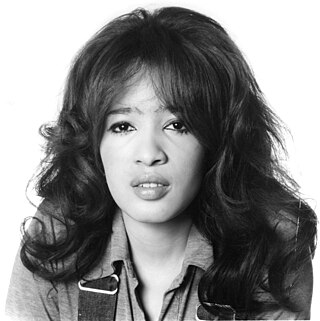
Veronica Yvette Greenfield was an American singer who co-founded and fronted the girl group the Ronettes. She is sometimes referred to as the original "bad girl of rock and roll".

"River Deep – Mountain High" is a song by Ike & Tina Turner released on Philles Records as the title track to their 1966 studio album. Produced by Phil Spector and written by Spector, Jeff Barry and Ellie Greenwich. Rolling Stone ranked "River Deep – Mountain High" No. 33 on their list of the 500 Greatest Songs of All Time. NME ranked it No. 37 on their list of the 500 Greatest Songs of All Time. The Rock and Roll Hall of Fame added it to the list of the 500 Songs That Shaped Rock and Roll. The song was inducted into the Grammy Hall of Fame in 1999.

William Thomas Medley is an American singer best known as one-half of The Righteous Brothers. He is noted for his bass-baritone voice, exemplified in songs such as "You've Lost That Lovin' Feelin'". Medley produced a number of the duo's songs, including "Unchained Melody" and "(You're My) Soul and Inspiration".
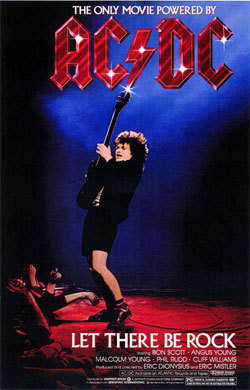
AC/DC: Let There Be Rock is a 1980 concert film featuring the Australian hard rock band AC/DC, released theatrically in September 1980 and on videotape the same year.
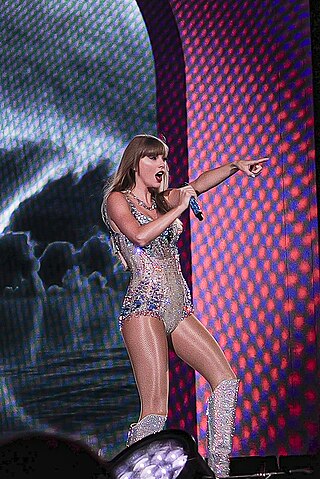
A concert film or concert movie is a film that showcases a live performance from the perspective of a concert goer, the subject of which is an extended live performance or concert by either a musician or a stand-up comedian.
As an icon of counterculture and underground rock the American rock musician and composer Frank Zappa has been featured and referenced in various different media.

The Modern Folk Quartet was an American folk music revival group that formed in the early 1960s. Originally emphasizing acoustic instruments and group harmonies, they performed extensively and recorded two albums. In 1965, as the Modern Folk Quintet, they ventured into electric folk rock and recorded with producers Phil Spector and Jack Nitzsche. Although MFQ received a fair amount of exposure, their rock-oriented recordings failed to capture their sound or generate enough interest and they disbanded in 1966. Subsequently, MFQ re-formed several times and made further recordings.
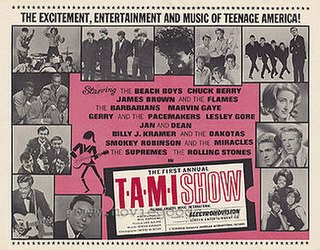
T.A.M.I. Show is a 1964 concert film released by American International Pictures. It includes performances by numerous popular rock and roll and R&B musicians from the United States and England. The concert was held at the Santa Monica Civic Auditorium on October 28 and 29, 1964. Free tickets were distributed to local high school students. The acronym "T.A.M.I." was used inconsistently in the show's publicity to mean both "Teenage Awards Music International" and "Teen Age Music International".
Lawrence "Larry" Peerce is an American film and TV director whose work includes the theatrical feature Goodbye, Columbus (1969), the early rock and roll concert film The Big T.N.T. Show (1965), One Potato, Two Potato (1964), The Other Side of the Mountain (1975) and Two-Minute Warning (1976).
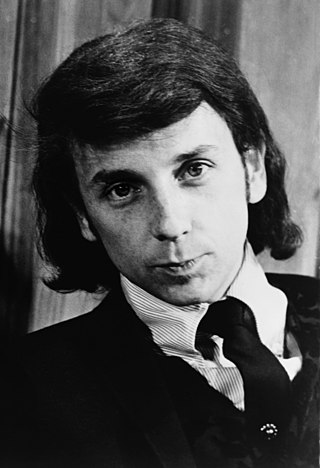
Harvey Phillip Spector was an American record producer and songwriter, best known for his innovative recording practices and entrepreneurship in the 1960s, followed, decades later, by his two trials and conviction for murder in the 2000s. Spector developed the Wall of Sound, a production style that is characterized for its diffusion of tone colors and dense orchestral sound, which he described as a "Wagnerian" approach to rock and roll. He is widely regarded as one of the most influential figures in pop music history and one of the most successful producers of the 1960s.
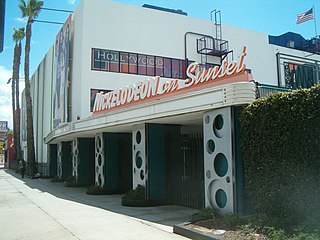
The Earl Carroll Theatre was a historic stage facility located at 6230 Sunset Boulevard in Hollywood, California. It was built by showman Earl Carroll and designed in the Streamline Moderne style by architect Gordon Kaufmann in 1938. The theatre has been known by a number of names since, including Moulin Rouge from 1953 to 1964 and the Aquarius Theater in the 1960s and 1970s. From 1997 to 2017, it was officially known as Nickelodeon on Sunset, housing the West Coast production of live-action original series produced for the Nickelodeon cable channel.

Edward Hoh was an American rock drummer who was active in the 1960s. Although primarily a studio session and touring drummer, Hoh exhibited a degree of originality and showmanship that set him apart and several of his contributions have been singled out for acknowledgment by music critics.
"This Could Be the Night" is a song recorded by the American band Modern Folk Quartet (MFQ) in 1965. The lyrics describe a couple on the verge of conquering their inhibitions. Written in tribute to the Beach Boys' leader Brian Wilson, the song is one of three that are credited jointly to Harry Nilsson and Phil Spector, although Nilsson submitted that he was the sole writer on a 1966 copyright form.
The TNT Boys is a Filipino boy band made up of three of the pre-to-early teen finalists of the 2017 television competition Tawag ng Tanghalan Kids. The members are Keifer Sanchez, Mackie Empuerto, and Francis Concepcion. In 2018, TNT Boys won as the grand winner in the second season of Your Face Sounds Familiar Kids. TNT Boys are the first Filipino act to perform in the four franchises of the talent show Little Big Shots in the Philippines, United States, United Kingdom and Australia.

















